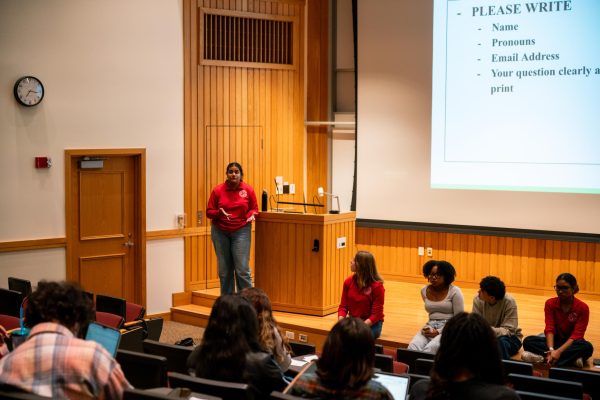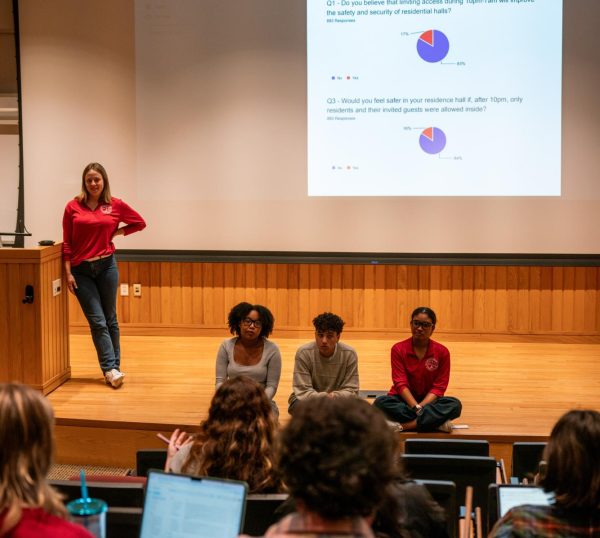Students Organize CDS Boycott
Oberlin students staged a boycott last Tuesday to protest Campus Dining Services after receiving two emails from the Office of Residential Education and Dean of Students Office regarding meal plan changes. Leaders of the boycott encouraged students to abstain from attending any of the CDS dining halls or DeCafé for 24 hours, and the boycott’s Facebook event received over 200 student responses. To increase accessibility, food donation boxes were set up in Langston Hall, South Hall, and Dascomb Hall — and many co-ops welcomed visitors for the day.
The protests were influenced partly by an error in which administrators had students register online for meal plans that will no longer be offered in the 2019–20 school year. The mistake was announced in a March 19 email from Assistant Vice President Adrian Bautista that contained information about the correct meal plan changes which will go into effect at the start of next semester. This was followed up by a more comprehensive email expanding on the plan from Oberlin’s Vice President and Dean of Students Meredith Raimondo on Monday, April 1, the day before the protest began.
“Students in their first and second year will participate in the GoYeo Plan: a plan that will provide unlimited access to breakfast, lunch, dinner, and healthy breaks between meals in Stevenson Dining Hall [as well as] … access to regular meals at Lord Saunders, break meals in Wilder, and $200 Flex [points] per semester,” she explained.
The other two options are only available to juniors and seniors. The Gold Plan features 200 meals a semester at any dining hall with $150 in Flex per semester. And the Cardinal Plan — which will become available in the fall of 2020 — includes 100 meals per semester at any dining hall with $100 Flex per semester.
In the email, Raimondo wrote that these changes were being made under the rubric of giving “greater flexibility” to students. However, many of the student protestors cited lack of flexibility as one of their main issues.
“The reason we organized was out of concern about how low-income students were supposed to pay for a more expensive plan with less flexibility,” said student organizer and College first-year David Mathisson, who set up the food donation boxes and organized an additional protest outside of Dean Raimondo’s office. “The email Dean Raimondo sent to the students … suggested that Fourth Meal was in danger, and while some concessions were included, accessibility to [how the] low-income students [would pay for the cost increase] was not included.”
While other students expressed similar sentiments to Mathisson, Raimondo maintains that the changes are meant to benefit low-income students.
“Need-based financial aid is assigned based on the cost of the meal plan (i.e., tuition plus fees),” Raimondo wrote in an email to the Review. “A family’s estimated contribution — whether it is $5,000, $20,000, or $50,000 — remains the same even when costs increase.”
College junior Yaxiong (Luke) Chen, one of the event organizers of the Boycott CDS event on Facebook, disagrees and feels that these plans do not increase student flexibility.
“The administration went back on its promises and simply imposed [these changes] on behalf of the student body,” said Chen. “[It’s] a reflection that shows how arbitrary and undemocratic the administration can be.”
Students who participated in the boycott hope to bring a more democratic process to Oberlin.
“Our demands are more affordable options, better qualities of food, and we want to push for an open forum in which students can voice their thoughts directly to the administration,” College sophomore Rena Wang said.
However, the effectiveness of these protests has been questionable. Even though over 200 people responded to the Boycott CDS Facebook event, Wang was disappointed that this represented less than 10 percent of the whole school. And while there weren’t any numbers recorded for how many people followed up on the boycotts, not a single person showed up on time to the protests outside of Dean Raimondo’s office.
College senior Jackson Zinn-Rowthorn felt ambivalent about the boycott.
“I’m not sure how much progress a boycott like this could make given that all of the meals have been paid for already, and I think the goals of the boycott are a little unclear,” he says. “But it’s good to have a boycott every now and again, as long as nobody goes f**king nuts, and it doesn’t seem like anybody went too nuts.”
The administration is taking pains to listen to student concerns and requests.
“I very much regret that Oberlin did not communicate these plans effectively to students, and I understand why people are frustrated by our ineffective communication,” Raimondo wrote in an email to the Review. “I hope the changes in Campus Dining that have happened or are in the works — from the addition of SkyBar Grab & Go to menu changes reflecting student input and the upcoming addition of flex to the new meal plan structure — demonstrates that we are listening carefully to student voices and seeking to provide as strong an experience as is possible within a sustainable budgetary model.”





